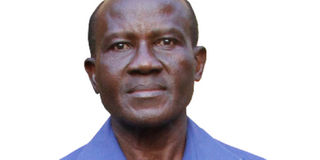Can Uganda refuse to be less loved by America?

What you need to know:
- The man’s visits become less frequent. The financial support gets accompanied by grumbling and unfriendly conditions.
- Instead of olive oil, he now brings some greasy palm stuff. So, although she still cooks, the food is not as good as it used to be.
There is a fairly common narrative in our newspapers:
A rich polygamist is tired of one of his concubines. She is extravagant, or loud-mouthed, or whatever. But because she always serves food when he is hungry, she wrongly assumes she is indispensable.
The man’s visits become less frequent. The financial support gets accompanied by grumbling and unfriendly conditions.
Instead of olive oil, he now brings some greasy palm stuff. So, although she still cooks, the food is not as good as it used to be.
She does not like the signals, but she hopes they are passing hiccups. She is in a state of denial. She stamps her foot down and says he cannot ditch her.
Because the man has many homes, and in a way is civilised, he bides his time; kind of let things work themselves out.
He concentrates on the other concubines; perhaps courts new lovers as well, but avoids embarrassing public scenes with this tiresome clingy one.
Again, from our newspapers, many an uncouth fellow actually chops off the head of the concubine.
In a way, America is rather like the more civilised polygamist. She has many companions, Uganda included.
Uganda was once a right-hand confidant, chatting freely with America’s palace set when they met or talked on the phone. Those were the days of Albright, Rice, Whitaker, another Rice, and so on; with a Chalker and a Short thrown in for trans-Atlantic effects.
Uganda’s warlike character and sharp mouth under NRM rule served America well. America could send Uganda to troublesome destinations to fight or brandish her teeth. As part of the bargain, America sorted out many of her survival needs.
Taking her provider for granted, or indeed incapable of counting, Uganda became more wasteful, more ill-mannered and sometimes insulted the provider even as she asked for increases in her upkeep.
Under an aging regime, Uganda now needs the physician, the dentist and the make-up salon more often, in a manner of speaking.
Seasoned diplomats are champions in the art of evasion and reframing questions put to them.
In the interview with the American ambassador, Ms Natalie E Brown, which appeared in Daily Monitor of September 24, there was an intriguing hint. Just a hint; that although not necessarily excluded, Uganda might not be America’s most valuable confidant or companion on America’s next tour of guerrilla-infested Eastern Congo, much as Uganda insists America still desperately loves her.
And Uganda’s upkeep?
The upkeep… the upkeep… Well, that will still come. Partly. But because (I suppose) Uganda is famously ‘sovereign’, she is expected to sort out more of her financial needs by herself.
By implication, Uganda has to think less as a spoilt notorious infant, lay out her priorities and spend more rationally, locking out her thieves and reducing her political parasites. Like American money (which perhaps spoilt her), Uganda’s money does not grow on trees.
America will not read the riot act to Uganda, because Uganda would bring out all that hackneyed stuff about slavery, race and imperialism. If Uganda is brain-dead, let sleeping dogs lie.
Donald Trump, Covid-19 vaccines, Afghanistan and Joe Biden (yes, Biden) have shown us what we should have known by sheer common sense, that at the end of the day, small nations, with their young people on board, have the responsibility – and must learn – to remove the jiggers in their feet if they want to walk properly.
Ambassador Natalie Brown acquitted herself well, providing the hints to guide us in reading the American temperament.
Mr Tacca is a novelist, socio-political commentator.
[email protected]




